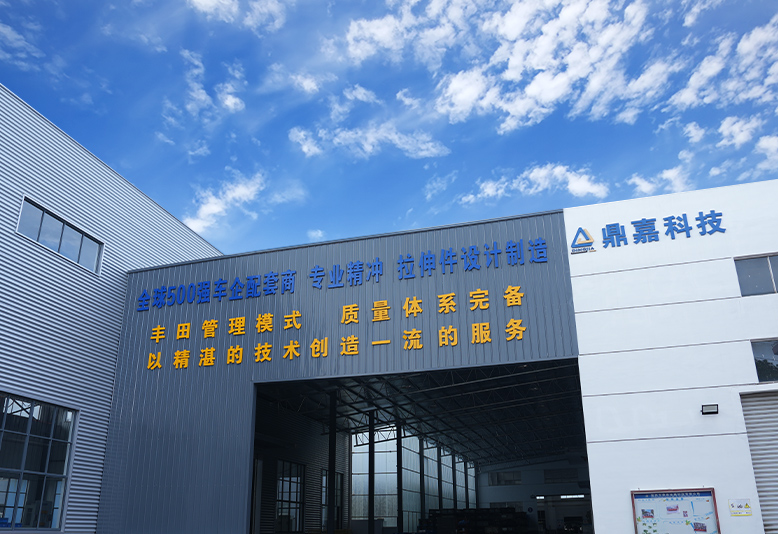The influence of surface treatment process of aluminum alloy stamping parts on the corrosion resistance of products
In the modern manufacturing industry, aluminum alloy stamping parts have been widely used in various high-demand fields such as automobiles, electronics, and medical equipment due to their excellent lightweight properties, machinability, and electrical conductivity. However, the corrosion resistance of these components remains a critical factor affecting product performance and longevity. Among the many influencing factors, surface treatment technology plays a decisive role in enhancing the corrosion resistance of aluminum alloy stamping parts.
Changzhou Dingjia Metal Technology Co., Ltd., established in 2010, is a private enterprise specializing in the design, assembly, and maintenance of precision metal molds, as well as the production of high-quality metal stamping parts. Located in Xueyan Town, Wujin District, Changzhou City—adjacent to the scenic Taihu Lake—the company benefits from its strategic geographical location, being approximately 220 km from Shanghai Pudong International Airport and 59 km from Changzhou Benniu International Airport. With a current plant area of 5400 m² and an additional 1500 m² expected to be completed by 2024, the company has continuously expanded its production capacity. Backed by a registered capital of 19 million yuan, Changzhou Dingjia has built a complete quality management system and earned widespread recognition for its integrity, strength, and product quality within the industry.
One of the key areas where the company excels is in the application of advanced surface treatment processes to improve the performance of aluminum alloy stamping parts. As a supplier to numerous well-known enterprises in the automotive, electronic, and medical machinery sectors, the company understands that corrosion resistance is not only crucial for maintaining the structural integrity of products but also directly impacts their service life and reliability.
Importance of Surface Treatment
Aluminum alloys, although inherently more corrosion-resistant than steel, can still suffer from oxidation, pitting, and stress corrosion under harsh environmental conditions such as high humidity, salt spray, or acidic atmospheres. This makes it essential to apply appropriate surface treatments to enhance their durability and functional lifespan.
Surface treatment processes typically include chemical conversion coatings (such as chromate and phosphate coatings), anodizing, electrophoretic coating, and powder coating. Each method offers different levels of protection and aesthetics, and the choice depends on the specific application requirements.
At Changzhou Dingjia Metal Technology Co., Ltd., anodizing is one of the most commonly used surface treatment techniques for aluminum stamping parts. Anodizing creates a dense oxide layer on the surface of the aluminum through an electrochemical process, significantly improving wear resistance and corrosion resistance. Additionally, this oxide film can be dyed in various colors, providing both protective and decorative functions. For example, in the automotive industry, where components are often exposed to extreme weather conditions, anodized aluminum parts produced by the company have demonstrated excellent anti-corrosion performance during long-term use.
Another important process employed by the company is electrophoretic coating. This technique involves applying a uniform paint film on the part's surface using an electric field, which provides superior adhesion and corrosion resistance. Electrophoretic coating is especially suitable for complex-shaped stamping parts, ensuring comprehensive coverage and protection. In the electronics sector, where miniaturization and precision are vital, Changzhou Dingjia’s application of this process ensures that even tiny components remain protected against environmental corrosion.
Impact on Product Quality and Customer Satisfaction
The influence of surface treatment on corrosion resistance directly affects the overall quality and market competitiveness of products. By adopting advanced surface treatment technologies, Changzhou Dingjia Metal Technology Co., Ltd. has significantly improved the durability and reliability of its aluminum alloy stamping parts. This not only extends product life but also reduces maintenance costs for customers, thereby enhancing customer satisfaction and loyalty.
Moreover, the company strictly adheres to international quality standards such as ISO 9001 and IATF 16949 throughout the entire production and surface treatment process. These rigorous quality controls ensure that every batch of stamped parts meets or exceeds industry expectations for corrosion resistance and performance.
The surface treatment process of aluminum alloy stamping parts plays a pivotal role in determining the corrosion resistance and overall quality of the final product. Companies like Changzhou Dingjia Metal Technology Co., Ltd., with their strong technical capabilities and commitment to quality, are leading the way in delivering high-performance solutions across multiple industries. As the demand for durable, lightweight, and corrosion-resistant components continues to grow, investing in innovative surface treatment technologies will remain a key strategy for manufacturers aiming to stay competitive in the global market.
Through continuous improvement and technological innovation, Changzhou Dingjia not only enhances the functionality of its products but also contributes to the sustainable development of the metal processing industry.









